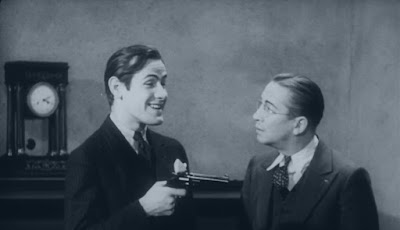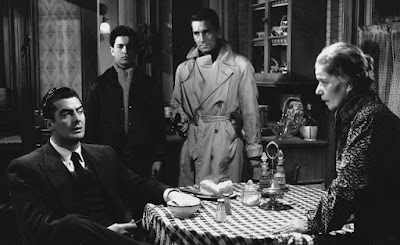recommend an old comedy by saying, "I thought it was pretty funny," nobody else will like it. It Never Happened probably won't break that streak. This nearly century-old one-reeler is so eccentric, so off-kilter, so damn sure of itself that it had only one theatrical screening before scurrying back where it came from.
A fairly unknown, unhinged UK production, The Man Who Changed His Mind was renamed by Warner Brothers for the US release because... maybe they didn't think Americans would get the sly dark humor of the original title? On the other hand, which title sounds more like one starring Boris Karloff as a Frankenstein-type doctor?
No matter what the movie's called, it's clearly an attempt at an American-style horror movie, and, as such, succeeds. Not only is the story acceptably strange, the art-deco lab equipment is pleasing to the eye as well. A plot device no longer accepted by society involves Dr. Laurience testing his mind-switching device on two hapless monkeys, one placid and the other rather testy. For some reason, it's eerier and more upsetting than when he does the same thing on humans. Only the British accents and dearth of familiar character actors separates The Man Who Changed His Mind from a first-rate Universal horror picture.
BONUS POINTS: Karloff chain-smokes throughout the entire movie, often dangling the cigarette from his mouth a la Peter Lorre.
DARK MOUNTAIN (1944): Some movies aren't worth talking about. Dark Mountain -- - the 57-minute B-drama from Paramount about a forest ranger who suspects the woman he loves is being held captive by her gangster husband -- would certainly be one of them if it wasn't for co-star Regis Toomey. Not that Toomey was ever a great actor. Doubling down a bit, it's easy to say his early light supporting roles promised nothing but a quick exit into real estate.But add a few years, pounds, wrinkles, and a cigarette-stained voice, and what was once a comedic leading man was now exceptional as cynical police detectives or, as in Dark Mountain, the quietly psychopathic criminal Steve Downey, all charm one moment before turning cold and dangerous when things go south. Whether he's killing a cop or his assistant Whitey (the legendary Elisha Cook, Jr.), Toomey is often shockingly violent while everyone else is just going through the motions.
As for the others, nominal leading actors Robert Lowery (forest ranger) and Ellen Drew (damsel in distress) could have been replaced by any second-string actors and no one would tell the difference. The same can't be said as Eddie Quillan, Lowery's comedic sidekick: nobody this annoying comes to mind. Dark Mountain proves that a movie can have a dozen things going against it, but as long as someone like Regis Toomey is around to jazz things up, it's a good way to pass the time over breakfast.
BONUS POINTS: Toomey refers to Lowrey as a "chump" and "squarehead" like he means it.
CRY OF THE CITY (1948): Police Lt. Vittorio Candella is on the trail of Martin Rome, asmall-time gangster who escaped from a prison hospital after killing a cop (and possibly being the brains behind a major jewel robbery). To the lieutenant's dismay, the charismatic Rome appears to be getting help from several people while on the run. Rome's kid brother Tony, girlfriend Brenda, a self-styled psychic named Rose, and a mysterious unnamed teenage girl who was the last person to visit him before his hospitalization all have reasons to protect him. Candella finally tracks Rome down, only to be wounded in a shootout. But Candella won't let that stop him, even if it means he has to break out from a hospital, too.
If you have a friend who wants to know what a film noir is, Cry of the City -- expertly directed by Richard Siodmak -- would be the place to start. All the noir elements are on display in their dark glory. The haunted cop. The smartass bad guy. Streets wet with rain at night despite sunny skies during the daytime. Dramatic camera angles, dimly lit sets, creepy supporting characters -- if Cry of the City weren't so good, it would almost be a parody of the genre. Even the leading actors -- Victor Mature as the cop, Richard Conte as the bad guy -- are out of a '50s issue of Mad magazine. The difference here is that the two actors, particularly Mature, are far better than one might expect.
Cry of the City -- a movie about two Italian-Americans on opposite sides of the law, and so overflowing with Catholic iconography that it must be a favorite of Martin Scorsese's -- also features some fascinating character actors pulling out the stops. Barry Kroeger (as a shyster lawyer) talks like Kelsey Grammar but resembles an evil Pixar character come to life. As the psychic, Hope Emerson is straight out of a nightmare. Walter Baldwin, as a prison trustee named Orvy, could be a real-life escapee from a psych ward. Add Fred Clark, Shelly Winters, Oliver Blake, Roland Winters, and Debra Paget, Cry of the City is a winner for movie fans who like their heroes troubled, criminals doomed, and women tougher than a cheap flank steak at a roadside diner.
BONUS POINTS: Cry of the City was the umpteenth 20th Century-Fox noir scored by Alfred Newman featuring his theme from the 1931 pre-code drama Street Scene under the credits. An evocative piece of music can go a long way.
*******************








No comments:
Post a Comment